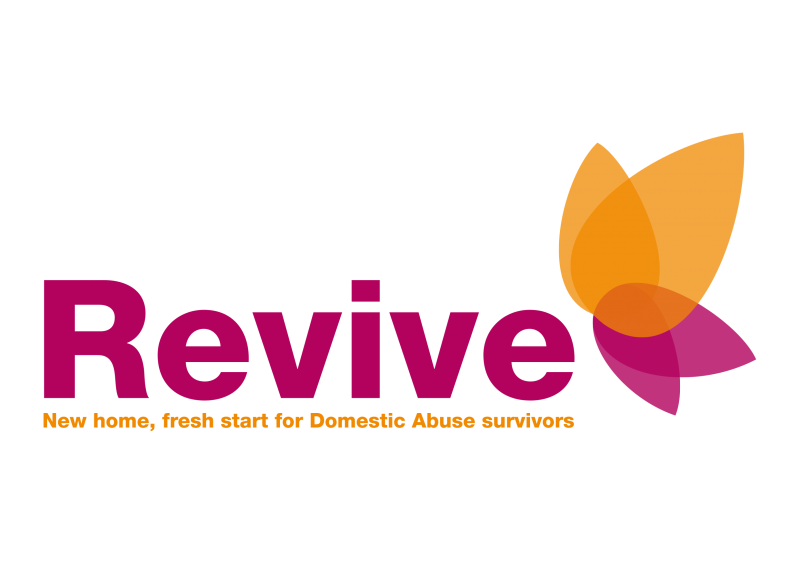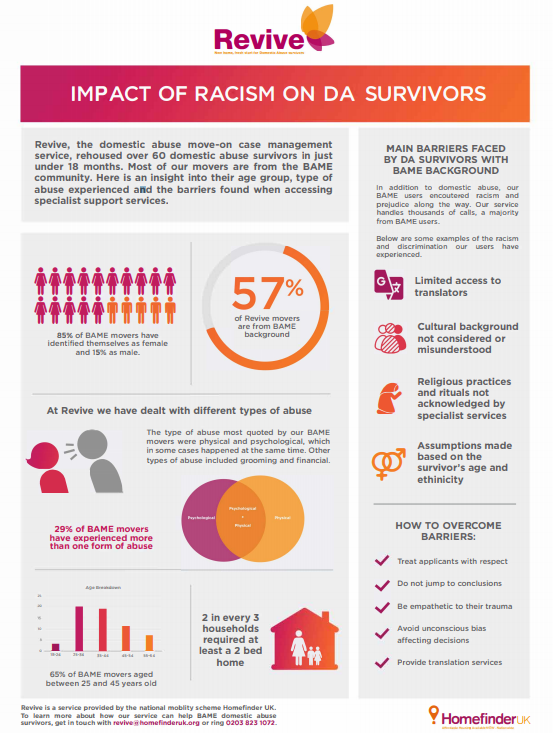
Homefinder UK’s Revive project highlights the lack of understanding by many statutory and voluntary agencies about the specific ethnic, religious and cultural concerns facing women fleeing domestic abuse.
Although domestic abuse can happen to anyone, women from Black, Asian or minority ethnic communities face additional barriers to receiving the help they need. Cultural identity, language or religion are often not taken into consideration by many relevant statutory and voluntary organisations. Their caseload shows that these issues also affect male victims.
More about the Revive Project
The Revive project is a domestic abuse relocation service, and it reports that 60% of the people they rehoused, have been from a BAME background. In addition to domestic abuse these victims also had to counter racism and prejudice along the way. Some applicants felt that their religion was a barrier when seeking support from other services – this was a particular issue for many women from a Muslim background who experienced widespread Islamophobia, highlights the report.

“As an overwhelmingly female and BAME team, we use our cultural and religious diversity and experiences to understand and interpret different practices that other organisations are just stereotypically judging. They come to us and we advocate for them to ensure they access their basic human right – for housing” says Brenda Fraser, Homefinder UK and Revive’s manager.
Why DA survivors stay
Many domestic abuse survivors stay in an abusive relationship due to lack of access to money due to their controlling partners. Or due to fears of becoming homeless or experiencing difficulties in finding a landlord who would accept rent paid through benefits. According to a recent Women’s aid survey*, out of 136 respondents, nearly 28% were still in abusive relationship; 68.4% of those indicated that concerns around future housing were a barrier to leaving.
Homefinder UK handles thousands of calls, a majority from BAME users who experience specific barriers to accessing housing and other services such as:
- Limited access to translators
- Cultural background not considered or misunderstood
- Religious practices and rituals not acknowledged
- Assumptions made based on the survivor’s age and ethnicity
- Prejudices around marital backgrounds
- Insufficient support around socio-economic factors, particularly to overcome poverty
The link between Domestic Abuse and Racism
Current perceptions leading to racism, discrimination, and cultural ignorance are some of the examples highlighted.
These include concerns that some statutory and voluntary services do not take an applicant’s cultural identity into consideration when making referrals – often jumping to stereotypical judgements. For instance, one applicant initially struggled to leave her abusive husband. This was because they were introduced (engaged) when she was 6 years old. He was 15 years older than her and he felt that he owned her. Added to this, in their country of origin, you remained married despite physical abuse. Revive staff had to explain to relevant decision making non-BAME workers the need to be patient regarding the applicant’s conflicted position regarding her marriage and to not take prejudiced positions which could have led to a property offer being withdrawn.
In another case, it was assumed that a young black woman was a member of a gang – rather than being a college student.
Some applicants felt discriminated against by relevant voluntary organisations because they were not informed of available financial support (grants). For example, an African woman was living in a refuge with predominately white women. After moving in she found out that the majority of these women had been supported to make applications for grant awards whilst she wasn’t even aware that such financial support was available to her.
Other non-BAME workers fail to understand the stigma BAME applicants face from their communities when they report or seek advice about the abuse they are experiencing. For example, a Muslim applicant faced being ostracized or worse killed for seeking help. She attempted to explain the aforementioned to a non-BAME worker. However, she was misunderstood and failed to receive the necessary support.
So what do we do?
These women and men experiencing domestic abuse cannot even take a telephone call for assistance because they cannot speak English or are under a constant watch from their perpetrator. This means their chances of obtaining help from an outside agency are minimal.
Brenda Fraser says: “We see applicants from all types of backgrounds, religions and cultures and acknowledge that English is often their second language. We use language skills of our multi-ethnic staff or bring in translators from other agencies to effectively communicate with all applicants. We also see quite a few men experiencing domestic abuse, and in fact, 15% of those housed were male applicants.
We are empathetic to the trauma experienced by all applicants, we don’t discriminate and pride ourselves in the caring and professional way we work, allowing for a faster and easier escape from an abusive relationship.”
More about Homefinder UK
![]() is a national housing mobility scheme available to anyone willing to move nationwide including:
is a national housing mobility scheme available to anyone willing to move nationwide including:
- homeless households
- applicants living in temporary accommodation
- private sector tenants threatened with homelessness
- victims of domestic abuse & grooming
- overcrowded families & social tenants
Homefinder UK is a national housing mobility scheme available to social housing landlords right across the UK. This web based housing mobility service enables applicants to look for homes nationwide or outside their local authority area. Full access to the scheme and our Case Management service is given to the home seekers of subscribed local authorities and housing associations.
Since our launch in winter 2013, Homefinder UK has successfully helped over 600 families to find new homes. To date, over 25,000 households have registered for our service seeking a home. Social landlords are able to advertise any immediately available properties on Homefinder UK website.



